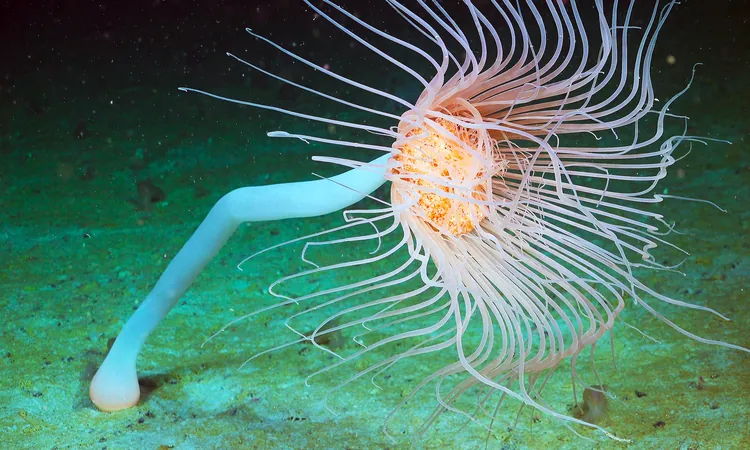
Scientists Uncover Thriving Ecosystem Beneath Antarctic Iceberg: A Glimpse into the Unseen
2025-04-01
Author: Jia
An extraordinary scientific expedition has revealed a remarkable new ecosystem beneath the Antarctic ice, providing insights that could reshape our understanding of life in extreme conditions. On January 13, 2025, the massive iceberg A-84, which is comparable in size to Chicago, calved from the George VI Ice Shelf in the Bellingshausen Sea, exposing approximately 209 square miles (540 square kilometers) of seafloor that had been shrouded in ice for centuries.
The research team from the Schmidt Ocean Institute, aboard R/V Falkor (too), arrived at this unprecedented site on January 25, embarking on a groundbreaking exploration of an area previously untouched by human eyes. In a swift change of plans, co-chief scientist Patricia Esquete from the University of Aveiro, Portugal, emphasized the urgency of this rare opportunity. “We didn’t expect to find such a beautiful, thriving ecosystem," she remarked, noting that the animal communities discovered have likely been thriving for decades or even centuries.
For eight thrilling days, the scientists utilized the remotely operated vehicle ROV SuBastian to survey depths of up to 1,300 meters (4,265 feet). The results were astonishing: the team discovered a lush underwater world teeming with corals, sponges, icefish, gigantic sea spiders, and octopuses, revealing a biodiversity far richer than previously imagined for such icy depths.
One of the most intriguing aspects of this discovery is how marine life could flourish in an environment devoid of direct sunlight. While deep-sea ecosystems often rely on nutrients drifting down from the surface, these organisms thrived beneath an ice layer up to 150 meters thick. Researchers propose that ocean currents under the ice might be channeling essential nutrients to these isolated communities, thus supporting their surprising abundance.
In addition to ecological findings, the researchers also collected geological samples to understand the historical behavior of the Antarctic ice sheet. With climate change accelerating the ice's melting and contributing significantly to global sea-level rise, co-chief scientist Sasha Montelli from University College London emphasized the importance of this research for future climate projections. "Our work offers critical insights into long-term changes that are vital for developing effective conservation policies as we face accelerating climate change," Montelli stated.
The mission is part of the Challenger 150 initiative, an international collaborative effort under the Intergovernmental Oceanographic Commission of UNESCO (IOC/UNESCO) aimed at deep-sea biological research. The coalition seeks to ensure that discoveries from the George VI Ice Shelf contribute to global efforts to preserve marine biodiversity.
As the researchers continue to analyze the wealth of data gathered, their findings hold implications not just for understanding Antarctic ecosystems but for global conservation efforts as well. With climate change posing unprecedented challenges, the resilience of these hidden habitats may offer clues to help manage and protect marine life on a broader scale.
In a world where the effects of climate change are increasingly dire, this expedition serves as a beacon of hope, reminding us of the hidden wonders waiting to be discovered beneath the ice. Stay tuned as the scientific community digs deeper into the revelations from this stunning oasis of life beneath the Antarctic ice!


 Brasil (PT)
Brasil (PT)
 Canada (EN)
Canada (EN)
 Chile (ES)
Chile (ES)
 Česko (CS)
Česko (CS)
 대한민국 (KO)
대한민국 (KO)
 España (ES)
España (ES)
 France (FR)
France (FR)
 Hong Kong (EN)
Hong Kong (EN)
 Italia (IT)
Italia (IT)
 日本 (JA)
日本 (JA)
 Magyarország (HU)
Magyarország (HU)
 Norge (NO)
Norge (NO)
 Polska (PL)
Polska (PL)
 Schweiz (DE)
Schweiz (DE)
 Singapore (EN)
Singapore (EN)
 Sverige (SV)
Sverige (SV)
 Suomi (FI)
Suomi (FI)
 Türkiye (TR)
Türkiye (TR)
 الإمارات العربية المتحدة (AR)
الإمارات العربية المتحدة (AR)